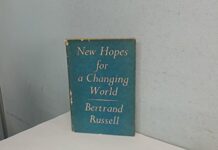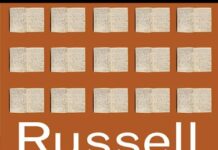
Ebook Info
- Published: 1953
- Number of pages: 122 pages
- Format: PDF
- File Size: 1.31 MB
- Authors: Bertrand Russell
Description
In this concise and luminous book, the winner of the 1950 Nobel Prize for Literature and perhaps the outstanding philosopher of our time – regarded by many educators, scholars and critics as the most original English thinker since David Hume – examines the changes in modern life brought about by science. He suggests that its work in transforming society is only just beginning,,, He shows that science now offeres the possibility of far greater well-being for humanity than it has ever known before…, In his final chapter the suthor faces the fundamental question of our time: can a scientific society be stable? He groups the possible causes of instability under three heads: physical, biological, and psychological. – excerpts from book’s synopsis
User’s Reviews
Reviews from Amazon users which were colected at the time this book was published on the website:
⭐Lord Russell makes an effort to face unpleasant realities like a serious empirical natural scientist. The Earth has finite fertile farmland and raw materials for a global industrial civilization. He makes the argument for rationing, which he testifies is neither feasible or practical solution. A brutal violent psyop cyber warfare between powers is the result of scientific improvements: higher lifespans and living standards.
⭐Clearly not just science is co opted. He states why. Hidden govt runs planet. Uses so called science to convince low college grad learning types. Are there true liberals left alive? Idk
⭐I don’t like Bertrand Russell. He and I are cut from different cloths. With that said, much of what Russell envisions in a future society is undoubtedly possible. He seems to find this future comforting, whereas I find this future to be a man-made hell on earth without escape. Perhaps, our comfort or displeasure with such a society depends on our title in the society- lord or serf.Red flags for philosophical disagreements with me are the London School of Economics and the Fabian Society. Both of which Russell played a part. I am also suspicious of those who use verifiable information out of context or angle it in such a way as to persuade the reader subconsciously to their own view. The book begins with “Man has existed for about a million years.” What “Man”? Homo Sapiens, modern day men, have existed for a little over 200,000 years. What “Man” does he speak of? Are we including all primates as “Man”? Also, including Judaism of the Old Testament as a religion that condoned “human sacrifice” is absolutely absurd. His weak examples are Jephthah’s daughter and Abraham’s son. Jephthah’s daughter has been discussed for centuries. Scripture never says that she was a victim of human sacrifice. If one does a study, they will find that most likely she was set aside; similar to a Nazarene, such as Samuel, Samson, or John the Baptist. Also, Abraham did not sacrifice Isaac, he was stopped by God. There are numerous scriptures that condemn the sacrifice of humans, especially child sacrifice. So either Russell is poorly educated in the matter or he is betting against a readership that will challenge his lies. I say all of this to make a point to the reader- you are reading the words of a tyrant- beware.In all of his talk against Theistic Religion sacrificing humans to a god, Russell was a Eugenicist. Eugenics is sacrificing humans to society for its own Civil Religion. Individual man must be sacrificed for the collective. He does not believe man to be biologically equal. “In this godless universe, we shall become gods (p.26).”Points I actually do agree with him on is that Technology aids in the centralization of power. Rebellions can be quashed with such technology, the threat of starvation being a major deterrent. The result of War is to make the State stronger. Where I disagree with him is that there is a need for a one-world government and the “potential” enemies it must create in order to force man into such a government. In order to obtain one-world government, potential enemies will be needed because people unite under fear and hate. Mass psychology must be used through media and education to obtain a Scientific Dictatorship. These sciences will be delegated to the governing class. The populace (you, reader) will “not be allowed to know how its convictions were generated (p. 41).” This Scientific Utopia will be controlled by thought not by armies.National sovereignty must be ended. Nations will not be allowed to judge their own causes. Technology, Psychology, and Physiology will give government more control over individual mentality. “Diet, injection, and injunctions will combine, from a very early age, to produce the sort of character and the sort of beliefs that the authorities consider desirable, and any serious criticism of the powers that be will become psychologically impossible (p. 62).” This should put a chill in anyone’s spine that vaccinates their children or feeds their children engineered foods.Population must be controlled (keep in mind population was 1/4 what it is today). There have been arguments against increased populations for centuries. The population bogey-man is always there to frighten people out of their liberties. Russell envisions a future where a chosen few will be allowed to become breeders, whereas the rest will be sterilized forcibly. Eventually there may be a new species of man. He admits there must be a “respect” for the Rights of Man, blah blah blah, but there comes a time when “it becomes right to inflict an injustice on an individual (p.64).” Interesting that these Technocrats never sacrifice themselves for the collective, but rather they choose you, dear reader, to be the sacrificial lamb.The fear of war must be removed, but war must be used to obtain a one-world government. Then that same government that was formed by war will end war. (Der?) This one-world government will be Democratic Socialism. Religion, of the Theistic kind, will be confined to leisure hours. The community has the right to “exact work from those capable of work” and the “duty to support all those willing to work (p.80).” In order to keep man from exterminating himself, people must forego certain liberties that are dear to them. So, man’s choice essentially is to become a slave to the one-world government or die. He fears that mankind may choose Death, my hope is that mankind chooses Life, and by Life I don’t mean Slavery to a small coterie of Plutocrats including those like Bertrand Russell.Russell’s fall-back argument for a one-world government is always population control. He even suggests that man can keep his liberty to procreate as long as biological weapons are used occasionally to keep the world from being too full. Religion and Nationalism are the major obstacles against controlling the population, but a one-world government will put both in check. Raw materials and food will be rationed to those who jump through the population control hoops.In the end, Russell envisions the need for a Scientific Society that is a single government, with an international army (of course this army won’t be needed once we all receive our mind-controlling diets and injections), with diffusion of prosperity (because material wealth gives people a “kind feeling” (p.108)), no occasion of envy (too cool!), a low birth rate (how these wealth programs will be paid for with a lessening population isn’t explained), and individual “initiative” (a kind euphemism)for both work and play that is compatible with the political and economic framework.What saddens me is that this could come to full fruition tomorrow and people would have no escape. What saddens me even more is that many people have become so numb to existence that they would have no desire to escape even if that escape was right at their fingertips.
⭐As the title implies; the author gives his opinion on the effects of science on the past, present (1953) and future. It is during his description of the past where he lets the reader know what a genius he is. Is it possible to have too much education?The references the author includes in his description of the past include the Bible, Milton, Newton, Shakespeare, Vesalius, Hervey, Aristotle, Galileo, Leonardo da Vinci, Darwin, Dante, Copernicus, Homer, Heraclitus, Nietzsche, Archimedes, Hakluyt, Pavlov, Freud, Fichte, Hammond, Benton, Hegel, Plato, Leopardi, Dewey, Orwell and Marx.He referenced or recommended reading: Dante’s “Divine Comedy”, Hubble “Realm of the Nebulae”, Hakluyt “Voyages”, Noris “Octopus”, Benton “Rights of Man”, Plato “Republic”, More “Utopia”, Plutarch “Life of Marcellus”, Orwell “1984” and Marx “Thesis on Feuerbach”. The whole of his historical references remind me of the movie “History of the World Part 1”; only without the humor of Mel Brooks.How did I stumble across this book? I watched an anti-fluoride video which referenced a book by R. Swinburne Clymer “The Age of Treason” (1959). Clymer cites Russell’s book as the plan of evil men for the subjugation of mankind. Here are some choice statements from the Russell book which were vigorously attacked by Clymer:”Fichte laid it down that education should aim at destroying free will, so that after the pupils have left school, they shall be incapable, throughout the rest of their lives, of thinking or acting otherwise than their school master would have wished.””Diet, injections, and injunctions will combine, from a very early age, to produce the sort of character and sorts of beliefs that the authorities consider desirable, and any serious criticism of the powers that be will become psychologically impossible. Even if all are miserable, all will believe themselves happy because the government will tell them that they are so.””The laboring class would have such long hours of work and so little to eat that their desires would hardly extend beyond sleep and food.”I do not begrudge anyone for being smart. One of the best books I ever read was Albert Einstien explaining basic physics. Russell gives me heartburn. He uses all of his references, all of his knowledge and ability to support his conclusion that a one world government controlling an international army is the only hope for mankind. I disagree.The book is fairly obscure. I only found it because it was referenced by the Clymer book. The Russell book is unique. You will not find much of what the author states in writing anywhere else. SDSerf
⭐Science enables us to know things and to do things. It give us power over nature. Now we live in a sort of “scientific society”; still surrounded by a great deal of superstitions, though. Here, Russell is telling a history about how science supported profound changes in human society. The usual basis: statement of facts must be based on observation and not by unsupported authority. The fun here comes from his witty discussion even stating that the impact of science is making us behave like cogs. Some rebellion is healthy otherwise we cogs may kill ourselves in this planet. Given the atomic bomb, Russell wasn’t very optimistic about the future.
⭐I probably paid a little too much for a 114 page book, but It came quickly. the book was exactly as promised and Bertrand Russell has a way with words I cannot deny. a truly insightful work. although I cannot claim to be a convert of all of the man’s logic, his arguments are well thought out and incredibly entertaining. I would recommend this book to anyone who has a passion for the study of philosophy or anyone who questions our technological oligarchy today.
⭐Its quite an easy read and flows well but his ideas are dreadful if you ask me!
Keywords
Free Download The Impact of Science on Society in PDF format
The Impact of Science on Society PDF Free Download
Download The Impact of Science on Society 1953 PDF Free
The Impact of Science on Society 1953 PDF Free Download
Download The Impact of Science on Society PDF
Free Download Ebook The Impact of Science on Society





